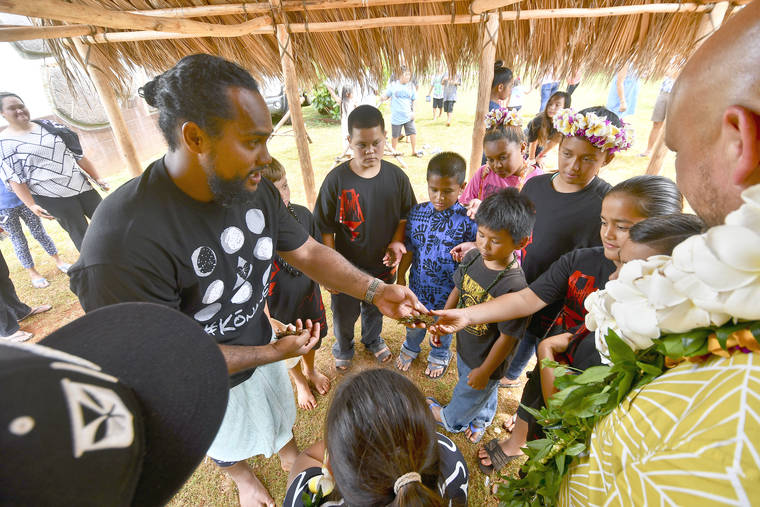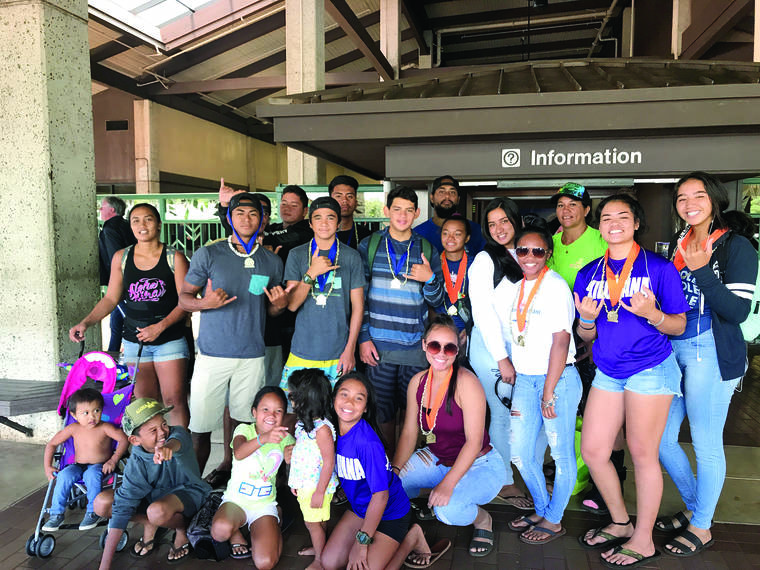KOLOA — The catalyst that motivates Kaina Makua to serve the people of Kaua‘i can be summarized in two words: “broken systems.”
Every Friday for the last 20 weeks, Kumano I Ke Ala has served up “Kupuna Plates” to West Side community members who have suffered financial hardships during lockdown.
Makua runs the nonprofit Kumano I Ke Ala, as well as a for-profit business Aloha Aina Poi Company, LLC. His two businesses have run parallel during the COVID-19 pandemic to help feed kupuna on the West Side. Using the resources from Aloha Aina Poi Company, Makua can help feed hundreds of families. Some weeks, his company feeds over 100 people and supplies over 400 kupuna on a first-come, first-serve basis.
Makua is motivated by teaching sustainability, his loyalty to Hawaiian culture and the complexities of a monetary system that is not conducive to allowing the average worker to live comfortably.
“The system is not built for us to succeed,” Makua, a 2002 Waimea High School graduate, said. “It is difficult for the everyday middle to lower class. It is tough for the average person to work more than two jobs to support his or her family so that they can stay afloat.”
Makua was nominated by Megan Fox as a Hometown Hero. Fox is the executive director of Malama Kaua’i, a non-profit organization that focuses on advocating, educating and driving action toward a sustainable Kaua’i.
“Kaina is very humble, but is the leader of commercial poi production on Kaua‘i, and even distributes to the other islands and the mainland as a young Hawaiian-owned business,” Fox said. “He is a great example of homegrown talent, and achieving business success to make our island a better place.”
Makua said the engine that motivates him is simple: making the island a better place for everyone that lives here.
“That is what drives me to try to do better for everyone in the community,” Makua said.
How has the COVID-19 pandemic affected what your companies do?
When I go to the schools, I’ve been preaching to the kids: one day, the barge is going to stop, and everyone will start farming, even if you do it in your backyard. When the food stops coming and the barges stop coming, what then? We don’t have enough to feed the people and the population.
What are the challenges of teaching the younger generation the real concept of sustainability?
I’ve heard some of the quotes that it takes seven generations to change. That is crazy to think about, but after I die, it makes sense. I think we are going to have to try our best and hold onto to what we know as the foundation, and continue the work ethic, sweat equity, and apply those things to give our kids a taste of it to provide them with some clear road.
Teaching them that concept is one thing. How do you reach them?
We must try to teach them these concepts or else we are going to fail them all, and they aren’t going to have a foundation. They need mentoring, and to build from the ground up. If they fail, they will have nothing to fall back on. We are constantly pushing kids so they don’t fall into doing drugs or living off unemployment. We are pushing them constantly so that the kid doesn’t become another statistic.
What can we do as a community to develop a more sustainable existence?
You hear a lot of people talk about the traditional Hawaiian diet. Well, that is something everyone should have. Everything that we provide on our plates comes from West Kaua‘i. There isn’t much that we buy that comes off of the barge. Knowing that, I think we have already won, but we still haven’t seen much change. I hear people say to me, “good job,” and I am thankful they feel that way, but we can always use more help and more volunteers.
What are some things that your company has done to change this? I know you teach as a coach of the canoe club, which is part of an incubator program to help young people transition into the working world.
A lot of people from the outside looking in think our business is a business that is making a lot of money. It is super important for people to understand that we’ve provided a lot of jobs for young adults with the paddling program as our incubator program. Through the canoe club, we introduce these kids to the non-profit and for-profit company I am running. We are not taking any money or selling stuff. We are teaching a model of sustainable living from the jump. We want to develop a pre-organic evolution. They learn to feed themselves in farming and manufacturing in whatever capacity possible. The kids that came through the program became the kids that are working and running this entire non-profit. We have four of them working for our non-profit, and five working for our for-profit. They help sustain our company, and pay the people who manufacture and later help feed our community at a low rate.
What are some of your future plans, now, with COVID-19? Does that change your focus?
We’ve had summer programs because we have farm volunteers and participants in the program and in the community. We take 25-30 kids who come to work at 8 a.m. and leave at 3 p.m. They plant food, use natural organic fertilizer, and have 12-acre parcels. We have a 12-acre food basket on the West Side of our community with as much as we can offer. If you stand behind the fence, you aren’t going to get into the ball game. You have to take steps yourself.
Is sustainability a mentality?
If we can be sustainable, then you aren’t worried if funding does or does not come. You are not worried about eating tomorrow, and every corner of the island, in my opinion, can do this. We can eat to sustain ourselves and feel good. If people don’t want to jump on board and see that they need, it becomes a necessity. We will have open hands and open arms.





